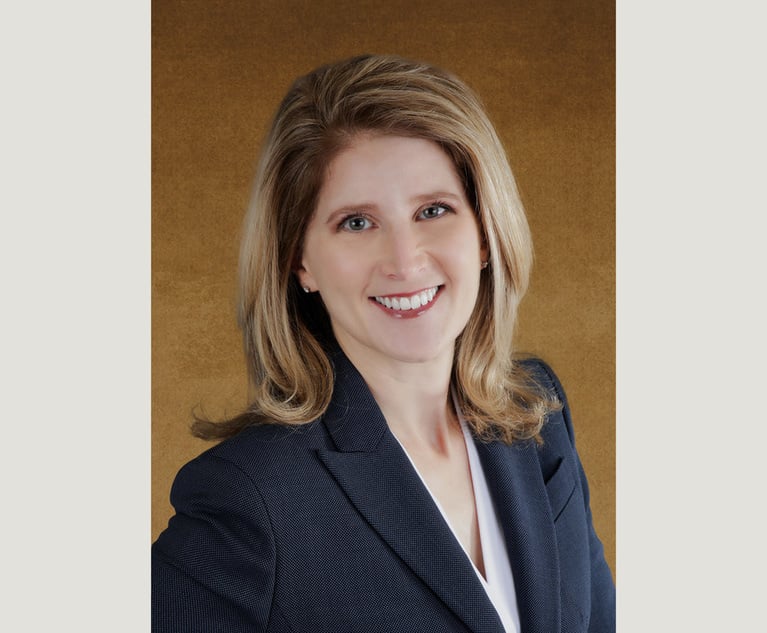Protecting and Planning for Your Estate During a Divorce
Even happily married couples often neglect to estate plan. It may seem overwhelming, perhaps time-consuming, and it certainly isn't as appealing as planning a vacation or a retirement party or any of the myriad of more attractive items on their lists. For those in the process of a divorce it is even more distasteful.
February 11, 2018 at 12:53 PM
8 minute read

Even happily married couples often neglect to estate plan. It may seem overwhelming, perhaps time-consuming, and it certainly isn't as appealing as planning a vacation or a retirement party or any of the myriad of more attractive items on their lists. For those in the process of a divorce it is even more distasteful. However, it's important to remember it doesn't matter how far along you are in the divorce process or how long the action has been pending, the law considers you to be legally married until the judge signs the final decree ending the marriage; and so there are some surprising estate planning issues to consider.
Should you have a will or should you change your will if you are in the process of divorcing your spouse?
Many clients make little effort to ensure their affairs are in order when they first appear at a divorce attorney's office. Why bother when you are not certain what assets you will be left with until the divorce is final, people often wonder. Many clients assume the court will intervene anyway and therefore it is a waste of time and legal resources to have a simple will prepared or changed.
First, let's consider what happens if there is no will executed at the time of death. In Pennsylvania, like most states there is a statute, referred to as an intestacy statute, that proscribes what happens to the deceased spouse's estate. The statute divides all of the property of the deceased which could be far more than just the marital component. If no children are born to the deceased, the entire estate goes to the spouse. If there are children of the couple, the surviving spouse receives $30,000 plus one-half of the estate, and if no children are born of the couple but the deceased has children from other relationships, the surviving spouse receives one-half of the estate.
Second, even if there is a will executed, the surviving spouse may elect against the will, which is a concept that prohibits someone from completely disinheriting their spouse. Whether you are happily married for one day or 40 years, whether a divorce complaint is filed or not, your surviving spouse has six months from your death (or date the will is probated, whichever is later) to file a spousal election under 20 Pa. Cons. Stat. Section 2203 with the Clerk of Orphan's Court in the county where the deceased spouse lived.
This election requests the Orphan's Court judge to award one-third of the entire estate to that disinherited spouse. The balance of the estate is then distributed in accordance with the terms of the will.
There are situations, however, when the elective share may not be utilized:
- A pre- or post-nuptial agreement is entered wherein the right to make this elective share is waived.
- For a period of one year or more before the death of a spouse, the other spouse can be proven to willfully neglected or refused to perform the duty to support the other spouse or has maliciously and willfully deserted the other spouse.
- The spouses are divorced, or if one spouse dies during the divorce action and although no divorce decree has yet been entered grounds for divorce have been established under 23 Pa. Cons. Stat. Section 3323.
When the spousal elective share is awarded, the surviving spouse receives one-third of the entire separate estate of the deceased, which for those individuals with significant premarital assets, or separate inherited assets, may be much more than what would have been awarded in the divorce. Therefore, it may make all the sense in the world to have a will in place that disinherits the soon to be ex-spouse so you maximize the amount of your estate that will go to your designated heirs.
What shall I do about the beneficiary designations on my life insurance and retirement plans during a divorce?
23 Pa. Cons. Stat. Section 3502 gives the court authority to enter an order directing the designations of retirement plans and life insurance policies remain as they were during the marriage throughout the divorce litigation in order to keep spouses in the same position in this regard as they were during the marriage. It is preferable not to change any beneficiary designations during the divorce proceedings as more often than not, the person will be ordered to change them back and the judge may look askance at the spouse seen to be maneuvering in this fashion.
The more common question is: what happens when a spouse forgets to change a beneficiary designation after the divorce has been entered and then dies still leaving the ex-spouse the beneficiary? How these benefits are paid out depends on whether the assets are ERISA assets and thus under federal law or whether they are under state sponsored plans. If the assets are ERISA governed plans, which could include life insurance, defined benefit and defined contribution pension benefit plans, federal law controls which means the beneficiary designation as stated controls even if the parties are no longer married, as in In re Sauers, 613 Pa. 186, 32 A. 3d. 1241 (2011). There is no ability to provide for a constructive trust whereby the benefits are not paid out until the dispute is resolved.
Pennsylvania otherwise is one of 23 states that have revocation statues which means that nonprobate assets are distributed as if the original beneficiary designation was revoked and the proceeds will pass according to whom the deceased is assumed to have wanted to receive the proceeds.
How can I leverage my unused federal unified credit?
There is a federal tax on transferring wealth to successive generations. Until only last December, the exclusion for the calculation of the amount an individual estate was subject to federal income taxes was $5,450,000 per spouse indexed for inflation. That figure has now become $11,000,000 per spouse under the most recent tax bill.
In 2012, this tax exclusion became portable, which means one spouse may direct their executor to pour all or part of any unused exclusion to the other spouse. This is accomplished by directing the executor file a federal estate tax form electing portability with Form 706 within nine months of the spouse's death.
The ability to transfer the remaining exclusion to the surviving spouse can create significant federal estate tax savings of as much as 40 percent for the estate of the surviving spouse. On $11,000,000 this could mean a tax savings of as much as $4,400,000. In order for this portability election to be made, the parties must be married at the time death. The unused unified credit is transferred to the last spouse to die by a director to the executor in the will of the first spouse to die. An additional benefit is the basis of assets held at death are valued at the stepped up fair market value at the later death of the survivor. This offers an opportunity to substantially reduce the taxable gain on the sale of inherited assets by children and other beneficiaries.
This portability can be part of the negotiations in a prenuptial agreement or a postnuptial agreement. The spouse agreeing to the portability can receive a benefit in exchange for conveying their exclusion such as being designated a lifetime income beneficiary of a trust (the principal of which may be transferred to children upon that spouse's death), an outright payment of a sum of money, or any of a myriad of financial benefits in acknowledgement of the value of the transfer of their unified credit.
There are other estate planning techniques such as transferring appreciating assets (such as closely held business) into a bypass trust. It is important to remember that one should be cognizant of estate planning issues at every stage of one's life whether before, during or after a divorce.
Candice L. Komar is a founding partner at the Pittsburgh-based family law firm Pollock Begg Komar Glasser & Vertz. An American Academy of Matrimonial Lawyers fellow, Komar is a litigator who often deals with complex issues in divorce, custody and support of high net worth individuals and is also a certified mediator and collaborative attorney. Contact her at [email protected] or 412-471-9000.
This content has been archived. It is available through our partners, LexisNexis® and Bloomberg Law.
To view this content, please continue to their sites.
Not a Lexis Subscriber?
Subscribe Now
Not a Bloomberg Law Subscriber?
Subscribe Now
NOT FOR REPRINT
© 2025 ALM Global, LLC, All Rights Reserved. Request academic re-use from www.copyright.com. All other uses, submit a request to [email protected]. For more information visit Asset & Logo Licensing.
You Might Like
View All
Pa. Supreme Court to Decide Enforceability of 'Browsewrap' Arbitration Agreements
8 minute read
From a Mediator’s Perspective: Common Mis-steps That Parties Make at Mediation
6 minute readTrending Stories
Who Got The Work
J. Brugh Lower of Gibbons has entered an appearance for industrial equipment supplier Devco Corporation in a pending trademark infringement lawsuit. The suit, accusing the defendant of selling knock-off Graco products, was filed Dec. 18 in New Jersey District Court by Rivkin Radler on behalf of Graco Inc. and Graco Minnesota. The case, assigned to U.S. District Judge Zahid N. Quraishi, is 3:24-cv-11294, Graco Inc. et al v. Devco Corporation.
Who Got The Work
Rebecca Maller-Stein and Kent A. Yalowitz of Arnold & Porter Kaye Scholer have entered their appearances for Hanaco Venture Capital and its executives, Lior Prosor and David Frankel, in a pending securities lawsuit. The action, filed on Dec. 24 in New York Southern District Court by Zell, Aron & Co. on behalf of Goldeneye Advisors, accuses the defendants of negligently and fraudulently managing the plaintiff's $1 million investment. The case, assigned to U.S. District Judge Vernon S. Broderick, is 1:24-cv-09918, Goldeneye Advisors, LLC v. Hanaco Venture Capital, Ltd. et al.
Who Got The Work
Attorneys from A&O Shearman has stepped in as defense counsel for Toronto-Dominion Bank and other defendants in a pending securities class action. The suit, filed Dec. 11 in New York Southern District Court by Bleichmar Fonti & Auld, accuses the defendants of concealing the bank's 'pervasive' deficiencies in regards to its compliance with the Bank Secrecy Act and the quality of its anti-money laundering controls. The case, assigned to U.S. District Judge Arun Subramanian, is 1:24-cv-09445, Gonzalez v. The Toronto-Dominion Bank et al.
Who Got The Work
Crown Castle International, a Pennsylvania company providing shared communications infrastructure, has turned to Luke D. Wolf of Gordon Rees Scully Mansukhani to fend off a pending breach-of-contract lawsuit. The court action, filed Nov. 25 in Michigan Eastern District Court by Hooper Hathaway PC on behalf of The Town Residences LLC, accuses Crown Castle of failing to transfer approximately $30,000 in utility payments from T-Mobile in breach of a roof-top lease and assignment agreement. The case, assigned to U.S. District Judge Susan K. Declercq, is 2:24-cv-13131, The Town Residences LLC v. T-Mobile US, Inc. et al.
Who Got The Work
Wilfred P. Coronato and Daniel M. Schwartz of McCarter & English have stepped in as defense counsel to Electrolux Home Products Inc. in a pending product liability lawsuit. The court action, filed Nov. 26 in New York Eastern District Court by Poulos Lopiccolo PC and Nagel Rice LLP on behalf of David Stern, alleges that the defendant's refrigerators’ drawers and shelving repeatedly break and fall apart within months after purchase. The case, assigned to U.S. District Judge Joan M. Azrack, is 2:24-cv-08204, Stern v. Electrolux Home Products, Inc.
Featured Firms
Law Offices of Gary Martin Hays & Associates, P.C.
(470) 294-1674
Law Offices of Mark E. Salomone
(857) 444-6468
Smith & Hassler
(713) 739-1250







